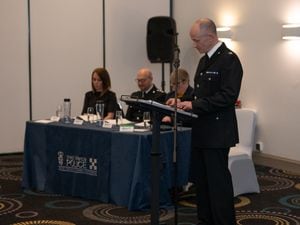Parents struggling to meet schooling cost
Children across Shropshire are arriving at school having not eaten breakfast and are missing out on extracurricular activities because of their family's finances and transport problems.

Two national studies by teachers' unions have revealed the problems faced by some children in the classroom, while a charity claims parents can struggle to meet hidden costs of £800 sending a child to school.
Teachers believe the situation in Shropshire is exacerbated by the county's low wages and the difficulty and cost of travelling to and from school.
The Children's Commission on Poverty has revealed that parents spend around £800 a year per child on basics such as uniform, meals, text books, trips and technology.
In some cases, families have resorted to cutting back on clothing, food or heating, and in some cases even borrowing money, to pay for school-related items, the charity reports.
Christine Hargest, honorary secretary of the National Union of Teachers in Shropshire, said: "I know that some schools have tried doing breakfast clubs and some Shropshire children are arriving at school without having breakfast."
Rural transportation added to the cost and lack of opportunities children had at school, she added.
"Shropshire has a huge problem that a lot of children spend a lot of time on a bus being brought to education.
"Most kids who are brought into school can't stay for an after school club. In some schools in the countryside schools they do those clubs in the lunch break.
"I think it's something that people don't recognise is happening.
"Our poverty is more easily hidden but it's still there. It's a different sort of poverty - it's easy to hide and more difficult to tease out."
Two-thirds of UK families, more than three million households, say they have struggled with the cost of school, the findings showed.
Euan Holloway, spokesman for the Children's Commission, said that transport is a key problem for school children in rural areas such as Shropshire.
Mr Holloway added that the transport situation went beyond cost, as pupils were missing out on opportunities like after school clubs because they had to take buses at certain times.
Two separate reports by teachers unions have reached similar conclusions.
One study, published by the NASUWT teaching union, reports pupils "hugging radiators" to keep warm, bringing in mouldy food in their lunch boxes and getting upset when they lose basic items such as pencils and rubbers.
Citizens' Advice Bureau chief executive for Shropshire Jackie Jeffrey added: "The common feeling is that people who are poor are on benefits, whereas actually it's people in work that are poor.
"Certainly with our clients, those who are on low pay or few hours or part time, they struggle to pay their bills and it's the food budget that's affected the most. They cannot afford good food.
"Child poverty is growing," she added.
A Department for Education spokeswoman said the government was taking "decisive action" to help disadvantaged pupils.





